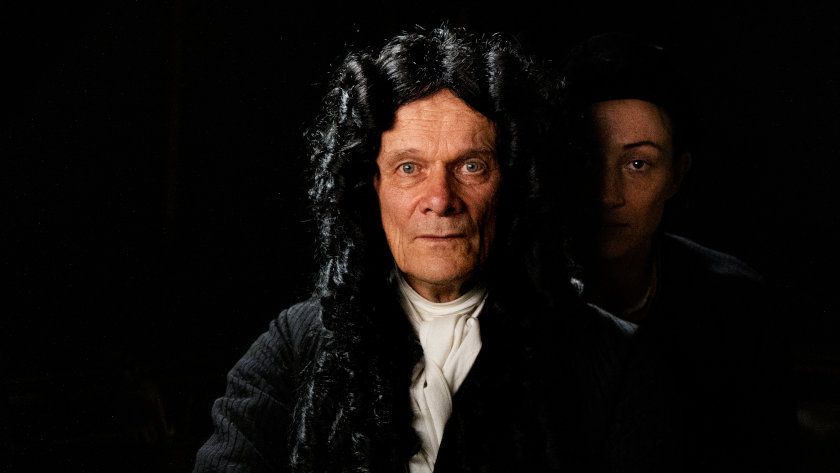Vassilis Kroustlalis reviews Edgar Reitz's film on Leibniz world premiered at the 2025 Berlin Film Festival (Berlinale Special).
Is a painting a frozen portrait of a moment in time (and therefore cannot capture the depths of a polymath like Leibniz? Or, something more is in place here.
The German veteran Heimat director Edgar Reitz undertakes in this relatively minor-looking, but still glacial and sincere, open-faced canvas of Leibniz: Chronicle of a Lost Painting (co-directed with Anatol Schuster) a reply to the eternal question of art and its significance -which becomes even more troubled when art has to signify the abstract philosophical thoughts of a polymath like Gottfried Wilhelm Leibniz (1846-1716, played with a tender thoughtfulness by Das Experiment professor, Elgar Selge).
The idea for this relatively playful film (despite its noble and sober theme) comes from the fact of a lost Leibniz portrait commissioned by Queen Charlotte of Prussia (Leibzniz's student). Queen Christina needs to reconnect herself with the intellectual (the film's first scene shows her almost in agony, looking for something other than tedious royal duties in a chiaroscuro background coming out of Caravaggio). The Leibniz portrait is the philosopher's last gift to take to Hanover (while her health is becoming more frail). Yet, this proves to be a daunting task. Leibniz won't care for the art of concrete, aesthetic representation -and the first painter leaves soon enough.
Enter the female Dutch painter, Aaltje van der Meer (Aenne Schwarz), whose boyish looks and demeanor reveal their own story -and let the philosophical drama begin. Even though Reitz presents his film more as a chronicle of sequences (leading up to a dramatic end) and a conflict story, Leibniz: Chronicle of a Lost Painting retains all elements of a good drama (the painter has her own Yentl-like tale to tell). The tested 'Educating Rita' narrative template (without the romantic love part) adds pure intellectual, sapiosexual charm. In turn, the format guarantees that theories like the windowless monads, Leibniz's indivisible soul-infested atoms, and the principle of sufficient reason (why there's something rather than nothing) will not be brushed aside.
The film delights in moving between the abstract and the particular, from the pigments to the pig bladders that need to sustain the above pigments enough for painting. Aaltje can mention Leibniz's rather average height before the film switches to his theodicy thoughts. Then, in another playful scene, Leibniz's collaborator Liepfried Cantor (Michael Kranz) shows Aaljte the stepped reckoner (or Leibniz calculus) the philosopher invented -which just malfunctioned at all the wrong time. In between, it plays with the lucidity of abstract thinking vs. the inexpressibility of the art ('what I don't know, I can paint', says Aaltje in the film). It also presents the artistic creation exactly as a director's job who must assemble everything on their subject's backstory before even shooting.
Leibniz is more successful in this philosophical-artistic relationship exchange (three erudite women surround a philosopher in the film) and convivial, well-mannered play of concepts than the answers to the questions its characters themselves pose. At points, it threatens to become a Leibniz compendium of sorts -yet, the film's dictum (uttered by Aaltje) that a painting represents the collected time of all who contributed (from pigments to the subject and the painters and the days spent) resonates nicely with the film's chronicle structure and the expressed need to hear than preach.
'Leibniz: Chronicle of a Lost Painting' (2025) premiered at the 2025 Berlin Film Festival (Berlinale Special).
Vassilis Kroustallis

